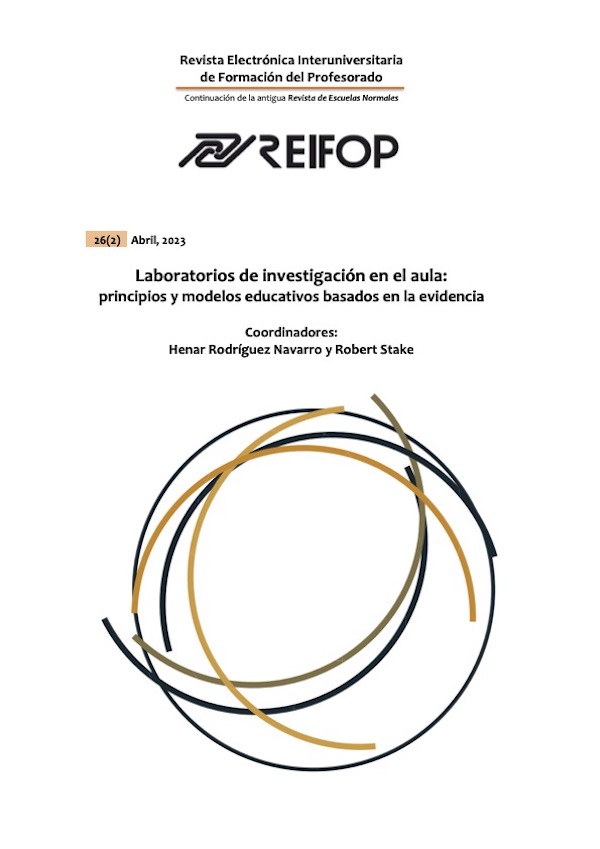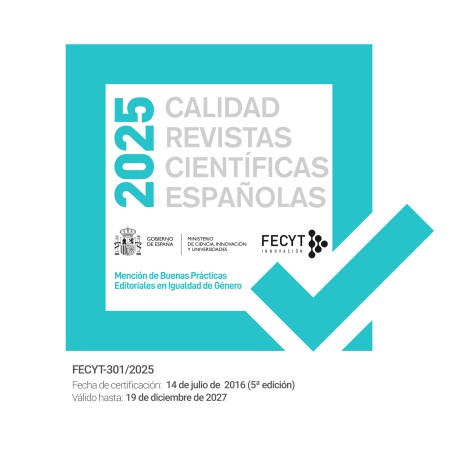¿Qué comparten los académicos de un grupo de investigación? Un caso de estudio crítico
Resumen
El propósito de este estudio es investigar el contenido del intercambio de conocimiento entre los académicos. Se pretende realizar una contribución empírica a un aspecto prácticamente inédito en el contexto nacional (español) e internacional. Para ello se planteó un análisis exploratorio basado en un caso de estudio crítico. Se realizaron 16 entrevistas a miembros de un grupo de investigación de una universidad pública española. Los resultados revelan que los académicos intercambian elementos de carácter explícito, tácito y apoyo emocional relacionados con la docencia, la investigación y la transferencia de conocimiento. Se ha constatado que el intercambio se refiere preferentemente al ámbito de la investigación y que existen diferencias entre los investigadores senior y junior en cuanto al tipo de conocimiento y al apoyo emocional que dan y reciben. Este estudio demuestra que el carácter tácito del conocimiento puede dificultar su transferencia y que el apoyo emocional, como parte del apoyo social, puede favorecer las prácticas de intercambio entre los académicos.
Descargas
-
Resumen522
-
PDF356
Citas
Akosile, A., & Olatokun, W. (2020). Factors influencing knowledge sharing among academics in Bowen University, Nigeria. Journal of Librarianship and Information Science, 52(2), 410-427. https://doi.org/10.1177/0961000618820926
Al-Husseini, S., El Beltagi, I., & Moizer, J. (2019). Transformational leadership and innovation: the mediating role of knowledge sharing amongst higher education faculty. International Journal of Leadership in Education, 24(5), 670-693. https://doi.org/10.1080/13603124.2019.1588381
Al-Kurdi, O. F., El-Haddadeh, R., & Eldabi, T. (2020). The role of organisational climate in managing knowledge sharing among academics in higher education. International Journal of Information Management, 50, 217-227. https://doi.org/10.1016/j.ijinfomgt.2019.05.018
Asrar-ul-Haq, M., & Anwar, S. (2016). A systematic review of knowledge management and knowledge sharing: Trends, issues, and challenges. Cogent Business, & Management, 3(1), https://doi.org/10.1080/23311975.2015.1127744
Bergami, M., & Bagozzi, R. P. (2000). Self‐categorization, affective commitment and group self‐esteem as distinct aspects of social identity in the organization. British Journal of Social Psychology, 39(4), 555-577. https://doi.org/10.1348/014466600164633
Bryman, A. & Bell, E. (2015). Business Research Methods. Oxford University Press.
Charband, Y., & Navimipour, N. J. (2018). Knowledge sharing mechanisms in the education: A systematic review of the state of the art literature and recommendations for future research. Kybernetes, 47(7), 1456-1490. https://doi.org/10.1108/K-06-2017-0227
Cheng, M. Y., Ho, J. S. Y., & Lau, P. M. (2009). Knowledge sharing in academic institutions: A study of multimedia university, Malaysia. Electronic Journal of Knowledge Management, 7(3), 313-324. https://academic-publishing.org/index.php/ejkm/article/view/853
Creswell, J. W. (2014). Research design: qualitative, quantitative, and mixed methods approaches (4a ed.). Sage publications.
Fari, S. A., & Ocholla, D. (2015). Comparative assessment of information and knowledge sharing among academics in selected universities in Nigeria and South Africa. South African Journal of Libraries and Information Science, 81(1), 41-52. https://doi.org/10.7553/81-1-1544
Fauzi, M. A., Nya-Ling, C. T., Thurasamy, R., Ojo, A. O., & Shogar, I. (2019b). Muslim academics’ knowledge sharing in Malaysian higher learning institutions. Journal of Islamic Marketing, 10(2), 378-393. https://doi.org/10.1108/JIMA-10-2017-0111
Fauzi, M. A., Tan, C. N. L., Thurasamy, R., & Ojo, A. O. (2019a). Evaluating academics’ knowledge sharing intentions in Malaysian public universities. Malaysian Journal of Library, & Information Science, 24(1), 123-143. https://doi.org/10.22452/mjlis.vol24no1.7
Fullwood, R., & Rowley, J. (2017). An investigation of factors affecting knowledge sharing amongst UK academics. Journal of Knowledge Management, 21(5), 1254-1271. https://doi.org/10.1108/JKM-07-2016-0274
Fullwood, R., Rowley, J., & Delbridge, R. (2013). Knowledge sharing amongst academics in UK universities. Journal of Knowledge Management, 17(1), 123-136. https://doi.org/10.1108/13673271311300831
Fullwood, R., Rowley, J., & McLean, J. (2019). Exploring the factors that influence knowledge sharing between academics. Journal of Further and Higher Education, 43(8), 1051-1063. https://doi.org/10.1080/0309877X.2018.1448928
Gottschalk, P. (2008). Knowledge Management. In M. E. Jennex, (Ed.) Knowledge management: concepts, methodologies, tools, and applications. IGI Global.
Howell, K. E., & Annansingh, F. (2013). Knowledge generation and sharing in UK universities: a tale of two cultures? International Journal of Information Management, 33(1), 32-39, https://doi.org/10.1016/j.ijinfomgt.2012.05.003
Ipe, M. (2003) Knowledge sharing in organizations: a conceptual framework. Human Development Review, 2(4), 337-359. https://doi.org/10.1177/1534484303257985
Ku, M. (2019). Similarity-dissimilarity and social capital in research knowledge networks: explaining knowledge sharing in academic institutions. Knowledge Management Research, & Practice, 17(3), 264-275. https://doi.org/10.1080/14778238.2019.1595986
Liao, S., Fei, W., & Chen, C. (2007). Knowledge sharing absorptive capacity, and innovation capability: an empirical study of Taiwan’s knowledge intensive industries. Journal of Information Science, 33(3), 1-20. https://doi.org/10.1177/0165551506070739
Lincoln, Y. S., Lynham, S. A., & Guba, E. G. (2011). Paradigmatic controversies, contradictions, and emerging confluences revisited. In N. K. Denzin y Y. S. Lincoln (Eds.). The SAGE handbook of qualitative research (4a ed., pp. 97-128) Sage publications.
Miles, M. B., Huberman, A. M., & Saldaña, J. (2018). Qualitative data analysis: A methods sourcebook (4a ed.). Sage publications.
Nokkala, T., Aarnikoivu, M., & Kiili, J. (2022). Multidisciplinary peer-mentoring groups supporting knowledge sharing in doctoral education. Scandinavian Journal of Educational Research, 66(5), 865-878. https://doi.org/10.1080/00313831.2021.1939142
Nonaka, I., & Takeuchi, H. (1995). The Knowledge Creating Company. Oxford University Press.
Patton, M.Q. (2002). Qualitative research and evaluation methods (3a ed.). Sage publications.
Phung, V.D., Hawryszkiewycz, I., Chandran, D., & Ha, B. M. (2019). Promoting knowledge sharing amongst academics: a case study from Vietnam. Journal of Information and Knowledge Management, 18(3), 1950032. https://doi.org/10.1142/S0219649219500321
Pyhältö, K., McAlpine, L., Peltonen, J., & Castello, M. (2017). How does social support contribute to engaging post-PhD experience? European Journal of Higher Education, 7(4), 373–387. https://doi.org/10.1080/21568235.2017.1348239
Ramayah, T., Yeap, J. A., & Ignatius, J. (2014). Assessing knowledge sharing among academics: A validation of the knowledge sharing behavior scale (KSBS). Evaluation Review, 38(2), 160-187. https://doi.org/10.1177/0193841X14539685
Ramayah, T., Yeap, J. A. L., & Ignatius, J. (2013). An empirical inquiry on knowledge sharing among academicians in higher learning Institutions. Minerva, 51(2), 131-154. https://doi.org/10.1007/s11024-013-9229-7
Rowley, J. (2000). Is higher education ready for knowledge management? International Journal of Education Management, 14(7), 325-333. https://doi.org/10.1108/09513540010378978
Saad, A., & Haron, H. (2013). A case study of higher education academics’ shared knowledge and classification. 3rd International Conference on Research and Innovation in Information Systems (ICRIIS), 439-444. https://doi.org/10.1109/ICRIIS.2013.6716750
Sandelowski, M. (1995). Sample size in qualitative research. Research in Nursing, & Health,18(2), 179-183. https://doi.org/10.1002/nur.4770180211
Saunders, B., Sim, J., Kingstone, T., Baker, S., Waterfield, J., Bartlam, B., Burroughs, H., & Jinks, C. (2018). Saturation in qualitative research: exploring its conceptualization and operationalization. Quality, & Quantity, 52(4), 1893-1907. https://doi.org/10.1007/s11135-017-0574-8
Stake, R. E. (1995). The art of case study research. Sage Publications.
Teddie, C., & Yu, F. (2007). Mixed method sampling: a typology with examples. Journal of Mixed Methods Research, 1(1), 77–100. https://doi.org/10.1177/1558689806292430
Vekkaila, J., Virtanen, V., Taina, J., & Pyhältö, K. (2018). The function of social support in engaging and disengaging experiences among post PhD researchers in STEM disciplines. Studies in Higher Education, 43(8), 1439-1453. https://doi.org/10.1080/03075079.2016.1259307
Wang, S., & Noe, R. (2010). Knowledge sharing: a review and directions for future research. Human Resource Management Review, 20(2), 115-131. https://doi.org/10.1016/j.hrmr.2009.10.001
Yin, R. K. (2009). Case study research: Design and methods (4a ed.). Sage Publications.
Los artículos que se publican en esta revista están sujetos a los siguientes términos:
1. El Departamento de Métodos de Investigación y Diagnóstico en Educación de la Universidad de Murcia (España), junto con el Servicio de Publicaciones de la Universitdad de Murcia (Editum) son los editores de la revista REIFOP y conserva los derechos patrimoniales (copyright) de los artículos publicados, permitiendo la reutilización de las mismos bajo la licencia de uso indicada en el punto 2.
2. Las obras se publican en la edición electrónica de la revista bajo una licencia Creative Commons Reconocimiento-NoComercial-SinObraDerivada 3.0 España (texto legal). Se pueden copiar, usar, difundir, transmitir y exponer públicamente, siempre que: i) se cite la autoría y la fuente original de su publicación (revista, editores y URL de la obra); ii) no se usen para fines comerciales; iii) se mencione la existencia y especificaciones de esta licencia de uso.
3. Condiciones de auto-archivo. Se permite y se anima a los autores a difundir electrónicamente las versiones pre-print (versión antes de ser evaluada) y/o post-print (versión evaluada y aceptada para su publicación) de sus obras antes de su publicación, ya que favorece su circulación y difusión más temprana y con ello un posible aumento en su citación y alcance entre la comunidad académica. Color RoMEO: verde.
















